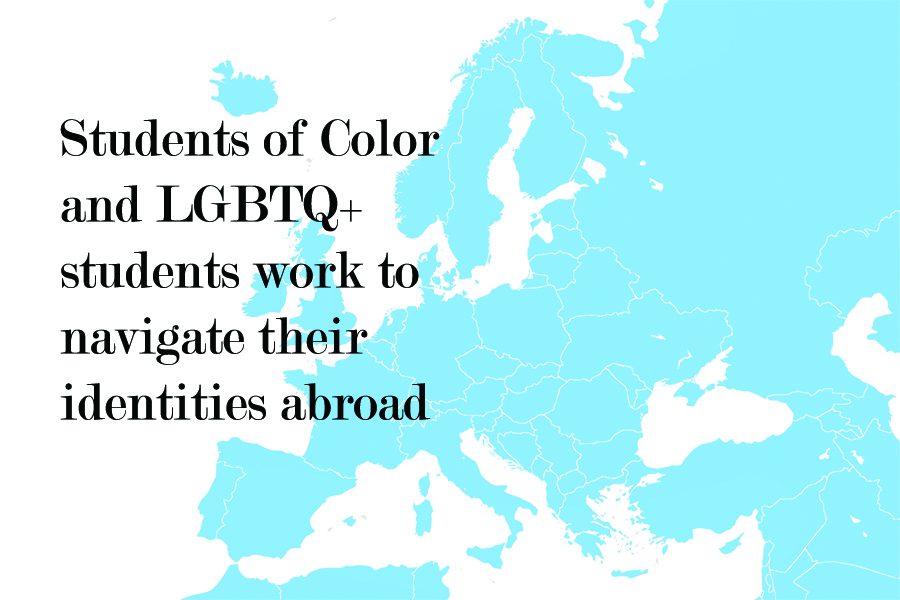Students of Color and LGBTQ+ students work to navigate their identities abroad
Emily Meyer | Intersections Layout Editor
Studying abroad offers the different challenges for marginalized students.
Of all of the students studying abroad from the U.S. in the 2015-2016 school year, only 28.4 percent identified as students of color.
Along with students of color who might feel ostracized or fear discrimination in foreign countries, LGBTQ+ students are confronted with not only how they will be represented or perceived abroad, but also their physical safety.
In 2013, the U.S. Department of State directly addressed the issues of LGBTQ+ citizens going abroad, where they often encounter anti-gay legislation and anti-gay violence, including verbal harassment, stalking and intimidation.
Tulane is not immune to the nationwide deficit of students of color and LGBTQ+ students who study abroad. Many students with marginalized identities face challenges when thinking of applying to study abroad, as well as specific issues once they are in a foreign country.
“I do know that when they had the study abroad fair last semester, I did not see as many students of color in the room,” Jewell Prim, a Tulane freshman who will be going on the “Migration, Race and Identity in The Dominican Republic” trip this summer, said. “At the same time, I had a lot of friends that are curious about it. I think we just have to push the message that these amazing global trips are things that are accessible to you as well.”
When considering studying abroad, many students with marginalized identities said they consider not only the accessibility and experience of international travel but also the commitments and communities they are leaving behind on campus.
“When students with marginalized identities are on this campus, they have to put in that much more effort to do well in all their classes, and they’re leading all the student organizations,” Henry Monkarsh, Office of Study Abroad peer advisor and Tulane senior, said.
Some said they choose not to study abroad for fear that they might miss out on opportunities to grow their leadership skills, or that positions will not be available upon their return.
“That is something we are really trying to demystify because that is, first off, not true,” Monkarsh said. “Second of all, your work doesn’t stop when you go abroad. This community is still here, and you can still be in contact with them.”
Even when students grapple with the question of whether or not to leave leadership positions and responsibilities behind, they are often faced with the reality of having a marginalized identity abroad. This can paint the experience of students, and the possibility can discourage some from applying.
“These students often have experience navigating diverse cultural spaces and ‘code-switching,'” Anne Gibson, associate director of Intercultural Learning at the Office of Study Abroad, said. “… However, when abroad these students face new challenges of being classified in new ways that often they hadn’t considered before.”
Before going abroad or even applying to a program, many students try to figure out what changes they may face in a new country. The Office of Study Abroad aims to help students understand the culture of the community they are stepping into. While OSA offers resources for students, it also recognizes that part of the research relies on the student and understanding that each identity offers a different challenge.
“Tulane is trying to meet students where they’re at on this campus, but they’re also trying to show them a lot of the resources,” Monkarsh said. “… Our office can only really show students so much until the students really have to pick up and say, ‘This is what I need to find out. This is what I need to be comfortable, and these are the resources I can use.'”
The Office of Study Abroad has recently made changes to its programming and services to meet the needs of students with targeted identities and address their specific issues with international travel.
“Latinx students studying abroad in Latin America may have to navigate feelings of connection or lack of connection to a region,” Gibson said. “It can bring up a lot of betwixt and between feelings. Students may feel anxiety about whether their Spanish is good enough or whether they will be seen as ‘Latino enough’ in the context of their host environment.”
The OSA will offer new pre-departure orientations that center on race, gender, sexuality, religion and other identities to help ease anxieties and meet the specific needs of these groups. In addition to these new orientations, the OSA recently introduced peer advisors, students who have gone abroad and can offer advice.
“Peer advisors are not just there when you need to apply abroad, they are there a year, two, three years before you think about going abroad,” Monkarsh said. “We are soundboards for you.”
Regardless of the challenges marginalized students face when applying and studying abroad, many say the experience allows for growth and opportunities that would not be offered otherwise.
“You’re not going to come out of study abroad the way you entered it, and that should be the way you want it to be,” Monkarsh said.
Leave a Comment
Your donation will support the student journalists of Tulane University. Your contribution will allow us to purchase equipment and cover our annual website hosting costs.




Rachel Tillay • Apr 16, 2018 at 9:16 am
Can you provide information on how the study abroad experience is made accessible to people with disabilities? How do students with disabilities find out if they’ll be able to get into businesses or classrooms if they use a wheelchair or a scooter? How do they find out if their service animal will be able to accompany them? What about access to medication, or other ongoing medical care?